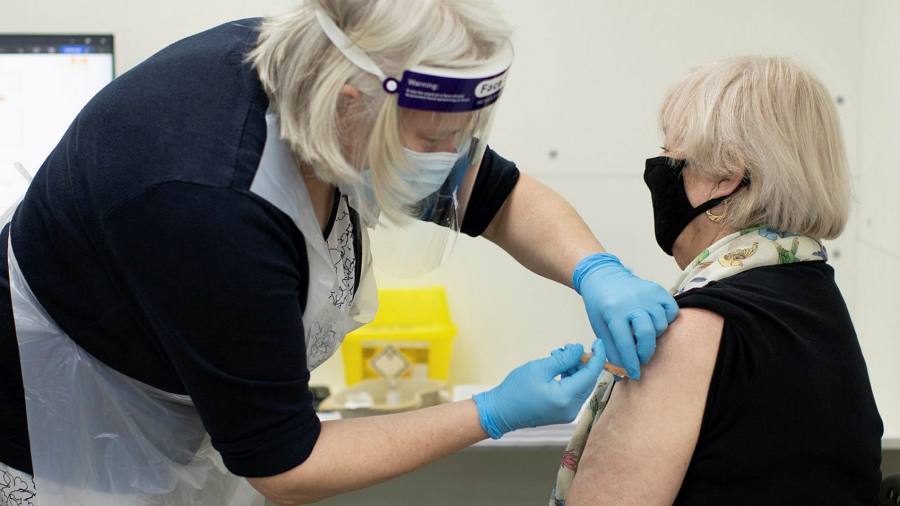[ad_1]
The UK government has set a target for vaccinating all people aged over 50 by early May, when local government elections will go ahead as planned, ministers have confirmed.
Several indicators published on Friday showed that Covid-19 infections have continued to decline across the UK. The official estimate of the R number — how many people each infected person reinfects — is between 0.7 and 1.0 for the UK, with new infections falling by 2 per cent to 5 per cent per day.Â
The government also reported another 480,560 first vaccine doses had been delivered, bringing the total to almost 11m.
It is on course to meet its target of vaccinating the 15m people considered most vulnerable by mid-February. After this is achieved, the prime minister is then expected to set out a full timetable for vaccinating the 17m people in the next most vulnerable categories, the 50-to-70 age cohort.
Matt Hancock, health secretary, said on Friday: “My plan is that we should be able to offer a vaccine to everyone in categories 1-9 — that’s all the over 50s — by May. Lots of things have got to go right to hit that goal — especially supply, which is the rate-limiting factor.â€
In a press notice, confirming that the UK’s local elections would go ahead as planned on May 6, the Cabinet Office slipped out the announcement that the most vulnerable groups would receive a jab by polling day.
“The UK’s vaccination programme is planned to have reached all nine priority cohorts by May, meaning that the government can commit to go ahead with these polls with confidence — and maintain the choice for voters between voting in person or remotely. â€
Chloe Smith, constitutional minister, said “democracy should not be cancelled because of Covid†and the government was confident the elections could be carried out “in a safe and secure wayâ€.Â
The decision to announce a May 6 deadline sparked a Whitehall row. According to government officials, the deadline was intended to be an “internal target†set by ministers and health advisers at a recent Covid-19 operations planning meeting.
Downing Street intended to keep specific dates private and was surprised when the Cabinet Office press release was published, according to government insiders. The health department was also not expecting the announcement. “Number 10 does not want to set any dates that could be missed. It’s all about playing down expectations†one insider said.
Meanwhile, the government confirmed that the spread of coronavirus is declining. In England, the R rate is between 0.7 and 0.9.
“We are now confident the epidemic is shrinking across England, though it remains important that everyone continues to stay at home in order to keep the R value down,†said the government’s scientific advisory group on emergencies.
The Office for National Statistics infection survey estimated that 846,900 people in England had the virus in the week to January 30, down from just above 1m in the preceding seven days.
Statisticians warned that infection rates remained high, however, as positive cases identified in the week equated to one in 65 people in England having the virus.
“While infections in England have decreased to below one million, they still remain high,†said Sarah Crofts, senior statistician for the survey. “Northern Ireland and Scotland have also seen a decrease in infection rates whilst in Wales they have remained level.â€
James Naismith, professor of biology at Oxford university, said: “The rollout of the vaccine will not yet have impacted upon these figures. The decrease is due to lockdown.â€
According to the Zoe Covid Study, the UK has 20,360 daily new symptomatic cases on average, based on swab tests of people with the symptom-tracking app. This represents a decrease of 29 per cent from a week ago.
Professor Tim Spector of King’s College London, lead scientist on the study, said: “We are making good progress against this virus, with 10m vaccinations done and cases down by 70 per cent since the peak at the beginning of the year. On top of that, we are also seeing hospital admissions from Covid drop too.â€
“But it’s not the time for hesitancy,†Spector added. “We’re now at the same levels of new cases we were when we came out of lockdown at the end of November.â€
[ad_2]
Source link





